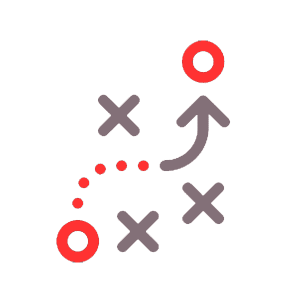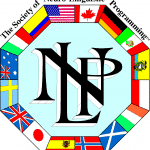

NLP Strategies – Let’s start with NLP first. NLP is a meta discipline. That is, it is a discipline of disciplines. It is the study of the structure of subjective experience and what can be calculated from that. Now a strategy is a high level plan to achieve one or more goals under certain conditions. For example, the specific strategy is traveling trough at least two representational systems. To remind you, the Representational System consists out of our Five Senses. Visual, Auditory, Kinesthetic, Olfactory and Gustatory. Combining these two we come to NLP strategies. For example: You have learnt in our NLP Practitioner to use your five senses, to generate and maintain rapport. All useful tools to execute a strategy.
But we are not here now to discuss what you have learnt up until now. It is time to combine all the tools you have and to see you make a start with applying strategies and eliciting strategies from others.
We can easily assume that all of our behavior is controlled by internal processing strategies.
All of us has a particular set of strategies for motivating yourself, coming into action, for delegating and learning. You have too much strategies to name them all in this article. So they are just examples to demonstrate how rich and knowledgable you already are!
On the other hand our cultural models do not explicitly teach us the specific aspects of the strategies that are required to achieve the behavioral goals intended by each model.
For example you can be very good at making money. But on the other hand you fail completely with others like loving someone or personal relationships.
By applying the techniques and procedures described in NLP, individuals in various corners of competencies have learned to modify existing strategies or have learnt to create new strategies from scratch for themselves.
The wonderful world of success is a matter of putting the most effective strategy to work. Most of the strategies can be easily learned or modified to tailor your personal needs to accomplish the goal you are pursuing.
Now it comes to eliciting a strategy. Basically strategy elicitation are two fancy words that mean nothing more than applying the tools you have learnt in an NLP Practitioner or Master Practitioner training.
The tools we have at our disposal are Rapport, The Meta Model, eventually Hypnosis where we use the Milton Model and a bit of State Control.
A golfer on hole one is ready to tee-off. He grabs Big Bertha put his pin in the ground and his ball on top. He takes his stance and starts making practice movements to hit the ball the best he can. In the meanwhile he looks at the pole where the hole is. Each repetition of his practice hit he first looks at the ball, then at the pole. In his mind he drags the pole closer and closer. Finally he tees-off and makes the perfect shot.
Let’s go over it statically.
Already by going over the story in a more static way we discover that there is a Decision, Visual and Kinesthetic aspects in this strategy. Now this example is just a simple demonstration of how a procedure for a tee-off goes. There are many many aspects you need to keep into account for a successful elicitation.
One of the aspects we did not discuss yet is to encourage and enhance the state the person is in the moment you want to elicit a strategy.
Another short example is, is that you want to elicit the strategy of a brilliant chef-cook that makes the most delicious cake. Let’s ask this first: Are you going to ask this Chef just on the street and rely on the fact that you understand everything he is saying?
Or do you invite this Chef to his kitchen to ask questions, to see what he is doing and to notice all the different movements in between, while he is finishing his success strategy for his delicious cake?
Probably you choose the second option. And that is what we intend to say, put the Cook in the Kitchen. Get the person you are working with fully associated with the strategy he or she is doing best. It ends up that it will make your work easier and the results better than they have ever been before.
Strategies of various kinds and complexity can be challenging to elicit them. We advise you to start simple. Start with something simple you do yourself.
Start by asking yourself, how do I put my coat on? Where is the coat located? How do you find your coat? Next, how do you put your coat on? Left hand or right hand first? When is the procedure “Putting your Coat on Ended?” All are relevant questions to elicit your own success strategies.
Our motto is to start simple. Once you have seen a simple example and you are successful in recognizing and decoding all the aspects, you are able to move on to a more complex one. The reason behind the fact to start simple is simple. We want you to succeed. Study, Learn, Understand, Adapt and Use!
Remember, to increase your efficiency as a NLP Practitioner, know your positive intention for the message you want to convey, build rapport and pay attention on what and how you use language. Leave people and business in a better place that where you found them, every day! Today you have learnt about NLP Strategies, to learn for yourself, or to apply to others.
Mind Tools provides NLP Practitioner and NLP Master Practitioner Trainings and Certifications. We educate you according to the renowned, latest and highest standards set by the Society of NLP. We will train you thoroughly in all the corners of Neuro-Linguistic Programming and some extras we learned from Richard Bandler directly.

Our NLP Practitioner Training starts in:
On Checkout use the code NLP10PCTOFF and gain an extra 10% off our already discounted price.